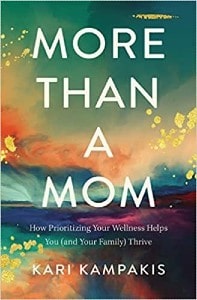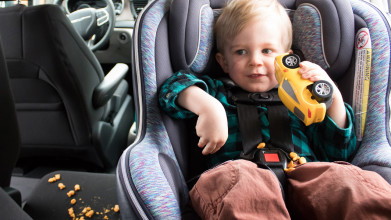Narrator: …And then, after leading her neighborhood Bible study and feeding all the needy children in the inner city, perfect mommy flew all around her sparkling clean home to plant flowers and wonderful love notes for her family. But she didn’t stop there — perfect mommy walked the dog, sang lullabies to the baby, and then gathered up daddy’s slippers and newspaper, waiting patiently for him to appear at the front door. Sigh…
John Fuller: (laughs) Well, that sounds kind of like a fairy tale from way back years ago, it’s really not possible to do everything perfectly as a mom or a dad, is it? Uh, probably not. Today on Focus on the Family, we’ll be sharing some insights and healthier perspectives on motherhood, in particular, uh, with practical ways that you can find the right balance of expectations, and priorities, and self-care. Thanks for joining us, I- I’m John Fuller, and your host as Focus on the Family president, and author Jim Daly.
Jim Daly: John, I don’t know if we say it enough, moms are incredible.
John: They are, yes.
Jim: I mean, that’s the bottom line, moms are steady, they are incredible. My mom was incredible. I mean, she was a single mom after my dad and her divorced when I was five. She had five children under 18 and she worked two jobs just to keep it all together somehow. I remember Sunday nights folding laundry with her-
John: Hm.
Jim: As a six, seven, eight year old. It was amazing. She just, she could do it, and now that I’m an adult with my own children, I’m going, “Wow. How did she do that?” And there’s so many moms in marriage doing well and single moms that are carrying a heavy load, and doing it as best as they can, and my heart goes out to you. I love moms. (laughing) I mean, they just… That’s it. My mom was that kind of mom, and I think the Lord created women for that nurturing and care. It’s like, they can give to the very end of their well, and they’ll give you the last cup-
John: Mm.
Jim: Out of that well for you if you need it, and that is the heart of a mother, and today, we’re gonna talk about being that kind of mom. Here’s an important observation from our guest today, she said, “With motherhood, there is no stopping point, there’s no clocking out, checking out, or leaving work behind, and as your kids grow up, the demands only multiply.” And that is a statement, and you’re gonna hear from her today, Kari Kampakis. She is full of mommy wisdom.
John: And I’m gonna encourage husbands to lean in here too because, uh, your wife has this role, (laughing) and this, uh… This is gonna be encouraging.
Jim: Thanks for that reminder, John.
John: And Kari is an author, speaker, podcaster, mom to four daughters, aging in range from 12 to 20 or so, and Kari has written a book that is gonna be the basis for our conversation today called, More Than a Mom: How Prioritizing Your Wellness Helps You and your Family Thrive. (laughing) We kind of like that tagline there.
Jim: Yeah, it’s good.
John: And we do have copies of the book here at the ministry, get in touch. Uh, our number is 800, the letter A, and the word FAMILY, or stop by focusonthefamily.com/broadcast.
Jim: Kari, welcome back to Focus, it’s good to have you.
Kari Kampakis: It’s great to be back.
Jim: Um, let’s get right to it, I mean, you’re the mother of four daughters. At what age was your oldest when your youngest was born?
Kari: She was seven.
Jim: So you had four seven and under?
Kari: Right, yeah.
Jim: Okay, so how’d you keep it all together?
Kari: Um-
Jim: That’s the question every mom wants me to ask you.
Kari: Yeah. By the grace of God. (laughing)
Jim: That’s a good answer.
Kari: I mean, it was survival in those years, it really was.
Jim: Well, you know, that idea of giving the last cup out of your well must have resonated with you. I mean, yeah, mom’s just k-… Have this incredible capacity to just continue to give, give, give, sometimes to their… Maybe often to their detriment. So, speak to that well idea, and how you need to keep something in the well.
Kari: Right. And, you know, this book, I don’t think I would have written it maybe even five years ago, but it’s probably the season of parenting that I’m in now that you start realizing, “Oh, all those things you heard, it really is true, just needing to rest and not running full throttle all the time.
Jim: Well, that’s encouraging for moms of younger kids that are listening-
Kari: Yes.
Jim: Because it does get… It’s different-
Kari: Yes.
Jim: You know, but the pace… When you have all the young kids at the home and you’re running around just trying to keep it all together-
Kari: Right.
Jim: Right, and get it all done, and, you know, for some moms, they’re also working too. That’s not uncommon today, so it’s this incredible juggling act that you never… I’m assuming you never feel like you, you got it all done the way you want to get it all done-
Kari: Right. It never feels like enough.
Jim: And how do you rest in that? (laughs)
Kari: Right, exactly, and, and there’s this feeling, and this mentality that, like, if I rest, or if I stop, the mothership is going to go down-
Jim: Mm-hmm.
Kari: And everything will fall apart. And what I’ve realized is that especially as your kids get older, they need more from you emotionally, but sometimes I was so tapped out that I was irritable, or angry, I was not able to give them what they needed emotionally, so it really makes you take a look at yourself and think, “Okay, what am I doing in my lifestyle that’s depriving my family, what they need from me?”
Jim: Yeah.
Kari: So, you know, for me, working from home, you know, a lot of people are working from home now, but… Which is great, I had the flexibility, but it can just bleed into everything.
Jim: Oh, yeah.
Kari: I don’t have set hours, and so I realized when I was working on a book, like, it takes me a long time to write a book. Some people can write it in six weeks or three months. I need at least eight months to a year, and so I’ve realized my, my first few books were on tight deadlines, and I’m like, “I can’t do that again.” Because I was living on four hours of sleep, and trying to raise a family, and I was irritable and grumpy. And so, sometimes you have to make those mistakes, and realize, like, that’s not the rhythm for me. I will never be that author who’s releasing a new book each year, and I’m at peace with that.
Jim: Yeah.
Kari: But God might be calling another mom, or another writer too, He might be giving them… Giving them the grace to be that person, and that’s fine, that’s their life, but r- recognizing our limitations, and what God is calling us to do, I think is huge.
Jim: I’m smiling just because I think that, that other person who’s got that kind of pace probably has similar problems-
Kari: Right. (laughing)
Jim: But they may not understand them quite the same way.
Kari: Probably.
Jim: Let me speak to that, you used the term rhythms, and you use that in the book, you know, finding that good rhythm, so if a mom doesn’t feel like she’s in a good rhythm, may not even feel like she can get to a good rhythm, h- how does she begin to explore that? What, what is a good rhythm look like? I’ve never really felt it.
Kari: Right.
Jim: Yeah.
Kari: I think the biggest thing is just knowing that you are a human being. I mean, the whole theme of this book is you’re more than a mom, like, we feel like that’s our biggest purpose in this world, and it is such a huge purpose, but more than that, our greatest identity is that we’re a Child of God-
Jim: Mm-hmm.
Kari: And He’s given us these gifts, our life, our body, our time, our family to be a good steward of these gifts, and we can’t be a good steward if we’re not taking care of our needs as a, a human being. So, the first thought is sleep, you know, making sure we’re getting enough sleep. And as we get older, I’m like, “I, I will not sacrifice my sleep anymore, like, it’s just better for me to stop at 8:00.”
Jim: (laughs) I resonate with that.
Kari: You know? I mean, my dad has said, he’s like, “The older you get, the more your body dictates what you can and can’t do.”
Jim: Yeah.
Kari: And I do think that’s a grace from God to kind of get us on a better pattern, in a better rhythm because now, I’m looking ahead. I’m like, “I want to be a healthy grandparent, I want to be able to support my daughters as they grow up.” But if I kept up this old pace that I was… I… That I had, I won’t be in a good position to do that, so-
Jim: Yeah. Well, speak to that. I mean, I would think… And again, just in our own household, you know, the pace was go, go, go. The kids would go down, when they were younger, at 8:00.
Kari: Mm-hmm.
Jim: Well, of course, then it’s all the stuff you’ve got to take care of, paying the bills, cleaning up, you know, getting some loads of laundry done, maybe, or something like that. How did you find a good rhythm in that regard that maybe you could get to bed at 9:00 so you can be fresh the next day?
Kari: For me, I’m such a, a doer, I had to really just minimize my to do list, and I know that’s counter cultural.
Jim: And be okay with it.
Kari: I had to be okay with it, like, you know, what are my two or three most important things that I have to do today? And then if I get those done and I have time to do other things, that’s just icing on the cake-
Jim: Yeah.
Kari: But I’m not going to put that pressure on myself.
Jim: Yeah.
Kari: So before, and like, with my calendar, I used to pack it full. I might have, you know, coffee with a mom in the morning and dinner that night with somebody, or I just would have too much in a day. So if there was a glitch in the day, or a child needed me, or I had to go check them out of school, or whatever, I would get mad and upset because I’d left no room for glitches.
Jim: Yeah.
Kari: And so, I really had to just learn to put some, some white space in my calendar, and I’ve even learned… And to be wise with your nos, and to know that, you know, we have to set boundaries in our life, and to think about how, you know, when we were growing up, parents and, and families could rejuvenate at home, that it was considered rude to even call somebody after 9:00 at night. So, you had that space to restore yourself, to decompress, and now, we’re expected to be on 24/7, and so, you know, like my mistake when cell phones first came out, I remember thinking I had to respond immediately just because that’s my personality. And so, it was detracting from my family, um, you know, at the ballpark, and-
Jim: Yeah.
Kari: Not paying attention to her-
Jim: Mm-hmm.
Kari: You know, her run that she’s running, uh, because I’m answering this email, so really setting boundaries on our time-
Jim: Yeah.
Kari: And then the world is not gonna fall apart if we make somebody wait for an answer to an email or a text message.
Jim: Yeah, and what I’m… What I’m hearing in there is a lot of prioritization.
Kari: Yes.
Jim: And don’t get me wrong, I’m not saying load up more, I’m saying good prioritization, meaning you know what you don’t need to do today.
Kari: Right.
Jim: That’s actually a good thing, it’s a good skill. Jean gave a wonderful compliment to a friend we have in Houston, we were over at their home, um, kind of a dinner party that she threw, and when we were leaving the house, Jean said to me, “That was so refreshing.” Her kitchen and her home looked lived in.
Kari: Mm.
Jim: She didn’t have to, like, clean it to the hilt, and Jean meant that as a compliment.
Kari: Right.
Jim: And she’s a mom of teenagers-
Kari: Right.
Jim: So she’s got a lot going on, and I thought, “Wow, that’s really good.”
Kari: Yes.
Jim: I mean, it didn’t… Jean was like, “Oh my goodness.” It just… Things were lived in, and there were things that were not picked up, and that’s okay.
Kari: Right.
Jim: And mom’s need to be good with that-
Kari: Right.
Jim: Even if company’s coming.
Kari: Yes, exactly.
Jim: I loved it.
Kari: Because sometimes we’re not getting those relationship needs met because we think everything has to be perfect before we can invite people over, and nobody cares, you know?
Jim: Yeah.
Kari: They just want to spend time together.
Jim: That kind of pours into this multi-tasking thing. You know, I think guys, we get so much, um… I don’t know, good feeling out of our title, or, you know, the fact, “Yes, I’m so busy. I had 14 meetings today, and oh, you wouldn’t believe, la, la, la. ” Right?
Kari: Right.
Jim: And I think women to a degree, they kind of that same ego stroke when it comes to multi-tasking.
Kari: Yes.
Jim: Women are good multi taskers. We multitask all the time, we do this, that, and… Uh, maybe not.
Kari: Right.
Jim: Maybe you need to assess that. How do you view multi-tasking?
Kari: You know, my, my thoughts on multi-tasking really changed. It was a few years ago when a mom was telling me that her brother’s a psychologist and said that we’re actually less efficient when we multitask. And, you know, when your… When your kids are little, I used to always say, “Mommy’s not an octopus” But that’s what I felt like.
Jim: Wow.
Kari: I mean, I was constantly multi-tasking-
Jim: What a great word picture.
Kari: But I was, I was like, “Okay, this child needs a sippy cup, (laughing) this child’s about to run out in the street.” You know, like, “Where’s the baby?” So you’re constantly multi-tasking, and I think for a lot of moms, we don’t ever get out of that mode, and so we’re doing several things at once. But what I learned about myself is I was more prone to making mistakes when I was doing that, like, I would have a check that I didn’t sign (laughs) and not send it in the mail because I was doing that.
Jim: You did that too?
Kari: Yes.
Jim: That makes me feel better.
Kari: Yes. (laughing) I mean, but I’m like, checking email at the same time, and working on a document, like, “Oh, I can… I’m gonna… I’m gonna multitask.” And so, I’ve had to really, like, train myself to just be like, “Okay, one thing at a time. Focus on one thing at a time.” And a friend of mine… I think this is a great example. She said that… She has four kids like I do, so lots of laundry, and she used to, when she was putting up laundry, she would listen to a sermon from church. And she goes, “I would put the laptop on top of my laundry basket, and like, go from room to room with this laptop.” (laughs) But she realized she was missing key parts of the sermon that way, so she would put up the laundry, and then she would make herself sit on the couch and just watch the sermon.
Jim: Oh, interesting.
Kari: Yeah, and I was like, “That’s such-” It’s common sense, but I was like… But she’s like, “That way, I could really take it in and not be distracted, and I think that’s a great example of not multi-tasking, we could be more efficient, and really be more present in our lives than if we’re trying to do three things at once.
Jim: I thought you were gonna say she threw the laptop into the washer, you know, with the laundry. Boom. (laughing)
Kari: Maybe that would have happened if she’d stayed on that path.
Jim: You know, that would happen once or twice and you’d learn, but, uh-
Kari: Yeah.
Jim: Let me ask you, you point to the example of Jesus. (laughs) This is always the trump card, right?
Kari: Mm-hmm.
Jim: But Jesus seemed to be wholly in the moment, you know, wasn’t multi-tasking, per se, retreated for refreshment for, you know… To reenergize himself, so what can Jesus teach the mom about, you know, managing the day?
Kari: Yes. I mean, I think the Bible is just full of these instances when Jesus… Especially before something big, like the night before He picked the disciples, he retreated to a mountain top and just prayed all night long. And just, He had to set boundaries around His time because people needed Him all the time, and just to remind ourselves, like, if Jesus could make time to rest, then surely we can too, the, the world will not stop spinning if we take a little time to rest. And instead, when we’re ready to pour out again, we’ll be giving 100%, rather than 80%.
Jim: Mm.
Kari: But is a fight, and you have to be very intentional because we live in a culture of unrest, and, um, you know, somebody told me once, I thought this was good, that, you know, you’ve got to prioritize what’s important over what’s urgent because what somebody else is considering urgent might not be what’s really important, and we can-
Jim: Yeah.
Kari: Spend our days just putting out fires, and spending our time doing all these things that don’t really benefit our family, or don’t really fit into the calling that God has for us.
Jim: Yeah. You know, so much of that environment, especially, again, with a mom with younger children-
Kari: Mm-hmm.
Jim: And just the go go pace that that creates, and you feel like it’s never gonna ease up, you know, it’s always gonna be like they’re two, three, and four, and it’s always gonna be a load of laundry, and it’s always gonna be all this stuff.
Kari: Yes.
Jim: And in that, you lose your joy.
Kari: Yeah.
Jim: Um, you mention in the book, uh, and you encourage moms in the book to choose joy. So, okay, this is gonna be complicated ’cause a mom’s listening, you’re listening right now, going, “You know, it’s hard to choose joy, Kari, you know?”
Kari: (laughs) Right.
Jim: “You remember those days of all that laundry everything going on? So h- how do you choose joy?
Kari: Right. You know, and I totally relate, and I think my life is… I don’t want to say it’s easier now, but I don’t long to go back to the little years, like, those were hard years, especially if your husband’s working late, like my husband was at the time, or, you know, you’re a single mom doing it by yourself and there’s so many needs. But, um, I do think looking for joy in the moment, and one… And a young mom told me this, she said, “My favorite parenting advice that I’ve had was a mom told me to… You know, to remember that when you’re wishing away the hard parts of this season, you’re wishing away the sweet parts of that season too.” So when you’re wishing away the toddler years, “I wish they would just, you know, quit getting ear infections, and quit throwing tantrums in Target” And all the things that make it so hard, you’re also wishing away how cute they look in their little pajamas at night-
Jim: Oh, yeah.
Kari: The fact that they want you to read them bedtime stories, you know, you think these moments will last forever and they won’t. We all know that, having older kids, that they won’t… They won’t give you that opportunity in a few years. And so, you know, to really just try to find those joy in the moment, and I, I look back sometimes on old videos of myself, and I’m like, “I totally missed the joy in that moment, or that season.” And one example comes to mind was I had this vision one Saturday morning. I had bought this fun blow up pool with all the bells and whistles at Target, (laughing) and I thought, “Okay, this is great. I’m gonna take… With my real camera, take some phone pictures of my girls the next morning.” So we had it all set up, had it all planned out in my head, and we had the video camera going on, and they run outside in their pajamas, like, this is not going according to plan, and they are jumping in the pool.
Jim: You wanted them in their swimsuit.
Kari: They… I want in their matching swimsuits, exactly. (laughing) I wanted… I had the vision in my head, and, um, I’m glad. I think my husband got it on camera and I’m glad he did because, you know, then the baby’s getting in there, and she has a diaper, and the diaper’s loaded with water, and you’re like, “Ugh, this is so playing out-”
Jim: Whoo, I thought you were going in a different direction. (laughing)
Kari: No, no, but, you know, like, the dia-… It’s just like, everything-
Jim: Yes.
Kari: It’s just like, one thing after another. It makes me feel so frazzled, and, and I’m thinking, “Y’all need to go put on your swimsuits.” And my husband’s dying laughing, but I watched that video a few years ago, and I just hear their squeals and their giggles, and I’m looking at it like, “Gosh, we had fun.” You know? Like, “We had fun. They had a great childhood.” And I totally missed the joy of that day because I was so irritated that it was not playing out the way I wanted.
Jim: So let me go back to that question, though-
Kari: Mm-hmm.
Jim: How do you choose joy? How, how do you… If you were to rewind that video tape-
Kari: Mm-hmm.
Jim: How would you have lived that differently that day?
Kari: I think I would have told myself, “You know what? Just go with it.”
Jim: Yeah.
Kari: You know, that these are kids that thank God that they are having a childhood, that they are getting to experience the magic of childhood because it will sure enough… You know, there will be moments when this is not the case, the culture that they’re in.
Jim: Yeah.
Kari: But just knowing that it’s temporary, and that, you know, one day, I’m going to miss this, and it’s not playing out the way that I want but I’m not going to let that steal my job. And for me, I have to remind myself that, you know, God is found in the present, and so many times we miss Him because we’re looking at the past, or we’re looking at the future. We want them to be easier, we think our life will be better in the future, or we’re dwelling in regret, or something from the past, and we’re just not enjoying that present grace. And it could be a terrible day, like I’ve had so many terrible days, but then I’m driving home and I see this rainbow. (laughing) Like, you know? And I’m like, “Thank You, God.”
Jim: Yeah.
Kari: Like, You knew I would be at this red light and that I would look up and see this rainbow, and that was exactly what my heart needed today.
John: That’s a great perspective today for every parent, and, uh, we’re so glad to have Kari Kampakis with us today on Focus on the Family. Um, a lot of her wisdom and her insights are captured in this book, More Than a Mom: How Prioritizing Your Wellness Helps You and Your Family Thrive, and we encourage you to get a copy from us. Our number is 800, the letter A, and the word FAMILY, or you can stop by focusonthefamily.com/broadcast.
Jim: Kari, there was a tender story that you shared that I think really, um, sums up so much of the experience of being a mom, and being a daughter, actually. It was that weekend that your mom was struggling, life and death struggle in a hospital, and you had to leave her and go with your daughter to a tea, and I think she was in kindergarten. That had to be… What a swirl of emotions. Describe that day, and what you were experiencing.
Kari: Yeah. That day was a real turning point for me as a mom. It was a few years ago. My mom passed away almost three years ago, but she had this four year illness and she never walked again-
Jim: Mm.
Kari: And this happened at the beginning. It was… It was right before Mother’s Day. She just… We don’t know why her, her health took a sudden decline but she was in really bad condition, like, we thought we were gonna lose her, and all I could think was, like, the irony of losing your mom over Mother’s Day weekend.
Jim: Yeah.
Kari: And so, she was in the hospital, and I remember being at the hospital on that Friday. I mean, we were all… My siblings and I had been crying all week, my dad looked like he’d aged about 10 years, like, it was just sad because we thought we were going to lose her. So, I’d been at the hospital crying all day, and my phone… The buzzer went of, the alarm went off, and I realized I had to go to a kindergarten tea for my youngest daughter, Camille, and I’m thinking, “I do not feel like going to that.” You know?
Jim: Oh, I can imagine.
Kari: You know, and I think so many moms are in that position, you’re just in such a sad situation, but I’ve got to go do this, so I, I made myself go, of course I wouldn’t miss it. And then I get to the kindergarten classroom, and the scene is completely different than what I’d just left. It was like I’d left this place of, like, you know, death, where people were nearing the end of their journey to this place of life, where these kids were just beginning their journey.
Jim: Mm.
Kari: And it was loud, and fun, and squeals, and laughter, and at first, I was like, “I don’t think I can do this.” But then as they started putting on their show, these kids, and they’re singing for their moms, and they’re just smiling, and happy, I found myself crying again, only this time, it was like tears of joy. And at first, I felt guilty. I’m like, “How can I be feeling this on a day when my mom is in such a bad position?” And then I remembered, like, God is just so gracious that He knew I needed this hour of joy on a really sad day. And more than that, you know, I, I never planned to have four children. I never imagined myself with four children, so when I got pregnant with Camille, it was a hard pregnancy. Like, I thought, “I can’t handle this. I- I’m al- already overwhelmed with three children.” So I just found myself thinking, like, “Even when I was c-…. When I was pregnant with Camille, and I couldn’t see the amazing blessing that she would be, God knew that He would use her on this day.” He’s used her in so many other ways too, but-
Jim: Mm.
Kari: It just made me go… Give thanks for His goodness, like, you knew that this child, I didn’t have the foresight to pray for, but thank You, God, that she’s part of our family, that on this day in particular, You would really use her to restore my heart.
Jim: Absolutely, and the poetry of the day-
Kari: Mm-hmm.
Jim: On Mother’s Day, and your mom dying, you know, in that hospital eventually, and then going to the party-
Kari: Right.
Jim: I mean, what, what a- an array of emotion for you.
Kari: Yes.
Jim: But to… You, you said it changed your life.
Kari: Mm-hmm.
Jim: H- how specifically toward your daughters, thinking about the future, you know? That’s a place you may be someday, right? That you will be.
Kari: Yes. Yes, exactly. And it’s just really… I think that was the beginning of this journey, where I’m just the age where… I call the 40s big league stress, you know, like your people are going through major things, whether it’s, you know, death, divorce, financial loss, wayward children, like so many things that can leave us just in a place of despair.
Jim: Mm-hmm.
Kari: And I find myself so often, like, “You’ve got to fight for your joy.” And it might be that moment of joy, but you’ve got to fight for those moments and see so many things are wrong right now, but this is right, and I’m gonna thank God that this is right, um, for today.
Jim: Yeah.
Kari: Um, but I think of the movie Steel Magnolias, which is one of my favorite movies, but in it, um, you know, the, the woman, one of the main characters, her daughter has died and her friends are consoling her, and it was Dolly Parton’s character, and she says, “Laughter through tears is my favorite emotion.” And I think that, you know, God gives us that gift of laughter, and He gives us those moments of joy, and sometimes that’s what restores our hope, and keeps us going, and moving forward. And I’m not saying we don’t need to feel the pain, and mourn, and grieve, but also do it as people of hope, as the Bible tells us.
Jim: Yeah. Well, that’s a good reminder. Um, describe the spiritual battle you want moms to prepare for, and how, how do they prepare? I mean, it sounds like you’re in a boot camp. (laughing) “All right, girls, here’s what’s gonna happen.” But what, what does that spiritual battle look like, and what do women, moms particularly, need to prepare for?
Kari: Yeah. I think moms just need to know that, you know, we live in a world of good versus evil, and what God wants. We have an enemy who wants the exact opposite, and I often think the Greek word for devil is diablos, and it means the one who divides. And my husband and I have been talking about this in our marriage, that sometimes when we’re, like, irritated with each other, or having that thought process, it’s taking you in a negative place, we have to tell ourselves, “That’s the devil getting to us to truly fight.” And so, I think that as moms, to know that to… It doesn’t matter if you’re just walking one step ahead of your child in faith, that you can be a powerful prayer warrior for your child, and for yourself too.
Jim: Mm.
Kari: And to know that it is a battle, and we know that God’s going to win this battle of good versus evil. He’s going to come out on top, and that through Jesus, we are conquerors, but it doesn’t always look pretty in the process. And just know that, you know, sometimes we’re barely hanging on but we’re still in the fight, and just to keep going, and like you said, surround yourself with, um… With Godly people, people who lift you up, who give you that, that glimpse of joy on a really hard day, just remind you that God is present, um, and just praying for the Holy Spirit, and the help of the Holy Spirit to, to get through these battles that we’re fighting.
Jim: Yeah. You know, Kari, moms can… Oh, they can just carry so much inside-
Kari: Mm-hmm.
Jim: That is never really revealed. You know, they’re just carrying all these burdens for their children, for their marital relationship. Then you have single moms who… You know, that has blown up, and they’re trying to carry the load, be mom and dad for their children, and it’s just such a variety of things that are occurring for that woman. You encourage women not to feel like victims, and that’s a very easy place for people to go, men and women, you know-
Kari: Mm-hmm.
Jim: But we’re talking about women today. But the one who doesn’t have the marriage she thought she would have, and therefore, her parenting is more difficult, and, and now I’ve become a victim of my bad marriage because I’m having to carry the load of so much. My husband’s disconnected, he’s not engaged with the kids, and that may all be true.
Kari: Mm-hmm.
Jim: Um, how do you encourage a woman not to be a victim, and what power is there in that?
Kari: You know, I think the power for me, what I’m so aware of, especially the ages that my girls are now, they’re teenagers, and when my mom passed away, I had so many memories from my teenage years and my early 20s, like, that was the flood, and I think it’s because one, you’re, you’re present with them still a lot, and also you’re in a place mentally where you’re really taking it in. So when I’m going through a challenge, or a hard time, I’m so mindful of like, “Okay, this is hard but I’m creating a blueprint for my daughters to follow.”
Jim: Mm.
Kari: And we have no idea, like our poor children, our grandchildren, like, they’re facing way bigger challenges than what we faced in our life, and so we’re really preparing them for that. I think as we look our challenges, are like, “Okay, what do I want to model for my child?” And I’m not saying don’t show them that, like, “I’m stressed today, I’m anxious.” But, you know, but really, modeling for them what we hope that they will do in their life because they’re going to have challenges too, and the way that we are coping with ours today sets a blueprint for that.
Jim: Yeah.
Kari: And, you know, and I, I think it’s so important because working with teenagers, like, they just see perfection all around them, and I think that’s the source of a lot of discontent and anxiety is they think their life is supposed to be perfect, or they’re supposed to be perfect, um, and it’s just not that way. And so, it’s like, setting that example, of, like, okay, this is not a perfect situation but we’re gonna do the best we can given these circumstances-
Jim: Yeah.
Kari: And trusting God to work with that.
Jim: Yeah.
Kari: And I mean, I think so many people you meet, that they are passionate about something. It’s usually because of a void in their life.
Jim: Yeah.
Kari: So say you’re worried your child is growing up without a father, and it’s so hard, and it’s, it’s not the way God designed it to be, but God can still use that void in their life. You know, if you’re faithful, and you’re teaching your child to be faithful, like, who knows that they might grow up and do something good with that-
Jim: Yeah.
Kari: And they might create a ministry, or do work that’s related to that void in their life, and it’s bringing purpose out of their pain.
Jim: Yeah, that’s so good.
John: Mm.
Jim: I think, uh, too… I think that idea of not becoming a victim is so powerful because as Christians, we’re, we’re victim to now one, right?
John: Right.
Jim: We’re salvation in Christ, and Christ is, is everything for us-
John: Mm-hmm.
Jim: And covers everything, so that joy should come a little easier. Kari, this has been so good.
John: Mm-hmm.
Jim: Thank you for being here today, and talking to moms about, uh, the important things in life. Let me ask you this last question.
Kari: Okay.
Jim: When your daughters are 40 and 50 something, whether you’re here or in heaven, what do you want them to say about you?
Kari: Oh. The first thing I want them to say is, “She tried.” (laughing)
Jim: That’s good.
Kari: That she tried.
Jim: She tried hard.
Kari: She tried. Knowing what she knew at the time, she gave her best, and she loved us. I just want them to have no doubt that I loved them, and I would sacrifice my life for them, and that they were worth that, and I hope that that’s what they will do for their children too.
Jim: Yeah. What a great model that is.
John: Mm.
Jim: Thank you so much for being with us.
Kari: Thank you for having me. I love being with y’all.
Jim: And like always, man, we are just scratching the surface of this great resource, More Than a Mom, and, uh, we want to get it into your hands so if you can make a gift to Focus on the Family, monthly or a one-time gift, we’ll send it to you as our way of saying thank you. If you’re that mom that is not in a good financial place, we want to get this resource to you, so just call us and we will get in your hands and trust that others will take care of the cost of doing so. That’s what ministry’s all about. So, thank you for wanting to be that mom that you can be, and for strengthening your abilities by getting a copy of Kari’s book.
John: And we’re so grateful to those who can donate to Focus on the Family, and thank you if you’re already part of the support team, and thanks for contacting us. To get a copy of this book, and as Jim said, make a donation. Our number is 800, the letter A, and the word FAMILY. 900-232-6459, or stop by focusonthefamily.com/broadcast. Coming up tomorrow, Dr. Tony Evans offers advice to single adults who want to get married.
Dr. Tony Evans: When you are looking forward to something that has not yet happened, then you can miss the “now” that God has for you.
John: On behalf of Jim Daly and the entire team, thanks for joining us today for Focus on the Family. I’m John Fuller inviting you back as we once again help you and your family thrive in Christ.




















